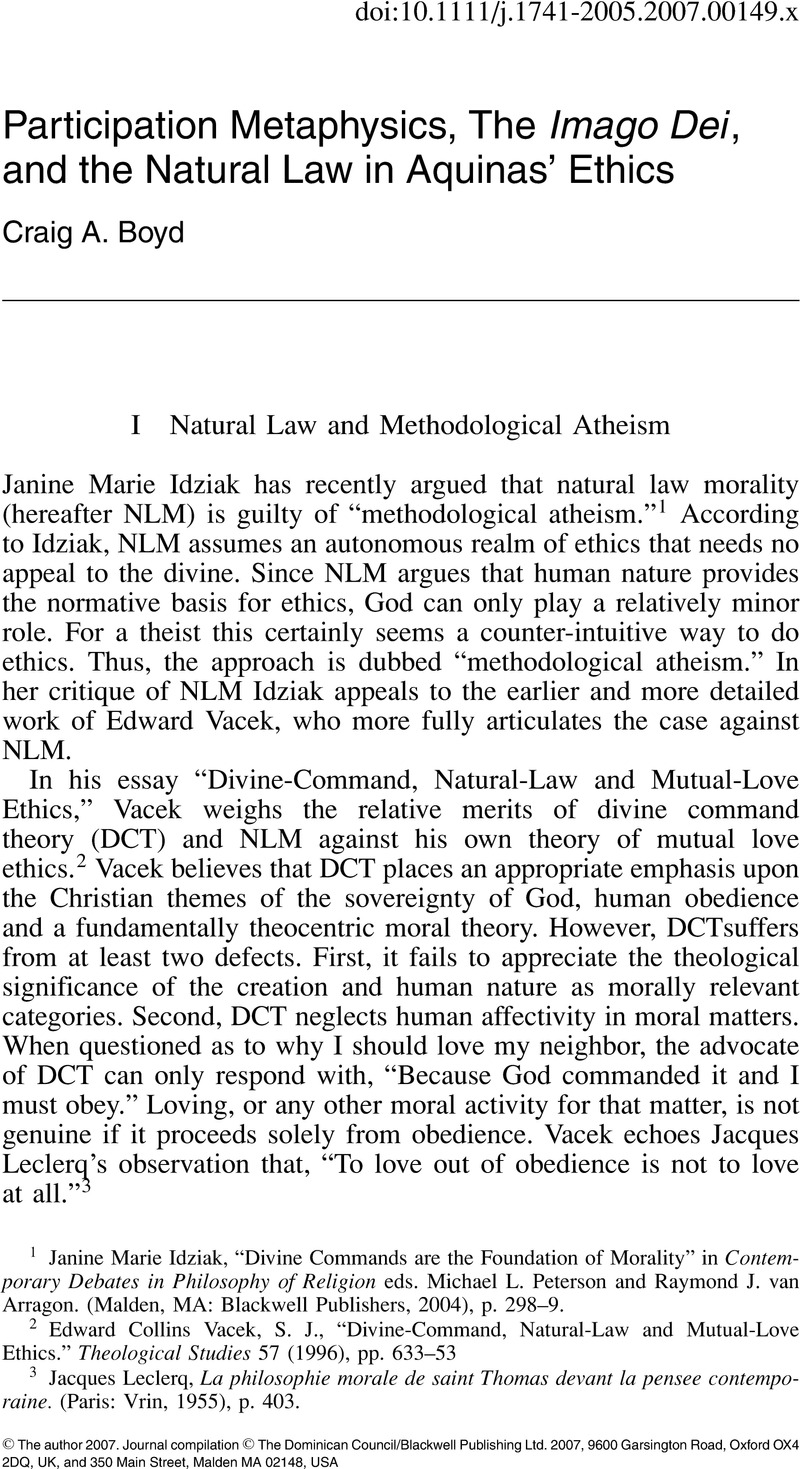Published online by Cambridge University Press: 01 January 2024

1 Idziak, Janine Marie, “Divine Commands are the Foundation of Morality” in Contemporary Debates in Philosophy of Religion eds. Peterson, Michael L. and van Arragon, Raymond J.. (Malden, MA: Blackwell Publishers, 2004), p. 298–9Google Scholar.
2 Vacek, Edward Collins S. J., “Divine-Command, Natural-Law and Mutual-Love Ethics.”Theological Studies 57 (1996), pp. 633–53CrossRefGoogle Scholar
3 Leclerq, Jacques, La philosophie morale de saint Thomas devant la pensee contemporaine. (Paris: Vrin, 1955), p. 403Google Scholar.
4 Nielsen, Kai, “God and the Basis for Morality,”Journal of Religious Ethics 10 (1982), pp. 347–8Google Scholar.
5 Vacek, “Mutual-Love Ethics,” p. 640.
6 Ibid., p. 640.
7 Ibid., p. 641.
8 For the view that God's role is secondary to moral ontology see Lisska, Anthony, Aquinas's Theory of Natural Law: An Analytic Reconstruction. (Oxford: Oxford University Press, 1996.)Google Scholar.
9 IaIIae.91.2. “Et talis participatio legis aeternae in rationali creatura ‘lex naturalis’ dicitur.” All translations from the Latin are my own. In questions 90 and 91 Aquinas uses some form of the latin word participatio no fewer than 24 times.
10 IaIIae.94.2. “Bonum est faciendum et prosequendum, et malum vitandum.”
11 Pope, Stephen J., The Evolution of Altruism and the Ordering of Love. (Washington, DC: Georgetown University Press, 1994), p. 54Google Scholar.
12 IaIIae.26.3 “Omnis enim dilectio vel caritas est amor, sed non e converso.”
13 Rahner, Karl S. J., “Love as the Key Virtue,”Sacramentum Mundi (New York: Herder and Herder, 1970), 6, p. 338Google Scholar.
14 Stump, Eleonore, Aquinas. (New York: Routledge, 2003), 88Google Scholar.
15 Porter, Jean, Natural and Divine Law: Reclaiming the Tradition for Christian Ethics. (Grand Rapids, MI: Eerdmans, 1999), p. 162Google Scholar; Also Kerr, Fergus, After Aquinas: Versions of Thomism (Oxford: Blackwell, 2002)CrossRefGoogle Scholar. “Time and again, the eternal law is identified with God himself. Everything created by God is subject to the eternal law but it makes no sense to say that anything divine is either subject to the eternal law or otherwise: ‘all that is attributed to the divine essence or nature does not fall under the eternal law, in reality they are the eternal law’ (1–2.93.4). God and the eternal law are identical,” p. 107.
16 Aquinas' language clearly reflects the logos Christology found in the prologue to the Gospel of John, verses 1–19. For Aquinas the Latin ratio more closely resembles the Greek logos than the Enlightenment understanding of “reason.” Cf. Tonneau, J., “The Teaching of the Thomist Tract on Law,”The Thomist 34 (1970): pp.11–83CrossRefGoogle Scholar.
17 See Finnis, John, Natural Law and Natural Rights. (New York: Oxford University Press, 1980)Google Scholar; also Budziszewski, J., Written on the Heart: The Case for Natural Law. (Downers Grove, IL: Intervarsity Press, 1997)Google Scholar.
18 Clarke, W. Norris S. J., “The Meaning of Participation in St. Thomas.”Proceedings of the American Catholic Philosophical Association 26 (1952), p. 150CrossRefGoogle Scholar; also cf. Wippel, John F., The Metaphysical Thought of Thomas Aquinas: From Finite Being to Uncreated Being. (Washington, DC: Catholic University of America Press, 2000), pp. 94–131Google Scholar.
19 Aquinas, Commentary on the De Hebdomadibus of Boethius, lect. 2.
20 Clark, “The Meaning of Participation,” p. 152.
21 It is important to note that Aquinas speaks of the human person being made “to the image of God” (ad imagine Dei) since it is only in Christ that we see the perfect image of God. Aquinas says “Primogenitus omnis creaturae est imago Dei perfecta, perfecte implens illud cujus est; et ideo dicitur ‘imago’ et nunquam ‘ad imagine’” (Ia.93.1,ad2). The idea conveyed here means that the image in human persons is a movement toward God, as I shall note later in the essay.
22 Dauphinais, Michael, “Loving the Lord Your God: The Imago Dei in Saint Thomas Aquinas,”The Thomist 63 (1999), pp. 256–7CrossRefGoogle Scholar.
23 Although this may sound like an Augustinian theory of “divine illumination” it is not. Aquinas' moral epistemology includes the natural ability to see secondary causes at work in creation by means of an essentially empirical approach to the world. Even though there are obviously Platonic ontological elements in his consideration of the eternal law, the means by which one comes to know the formal nature of any being is by means of Aristotelian epistemology.
24 MacIntyre, “Which God Ought We to Obey and Why?”Faith and Philosophy 3, (October) 1986, p. 364.
25 Dewan, Lawrence O.P., “Wisdom as Foundational Ethical Theory in Thomas Aquinas.”The Bases of Ethics, ed. Sweet, William. (Milwaukee, WI: Marquette University Press, 2000), p. 44Google Scholar; Also Wippel, The Metaphysical Thought of Thomas Aquinas, p. 474.